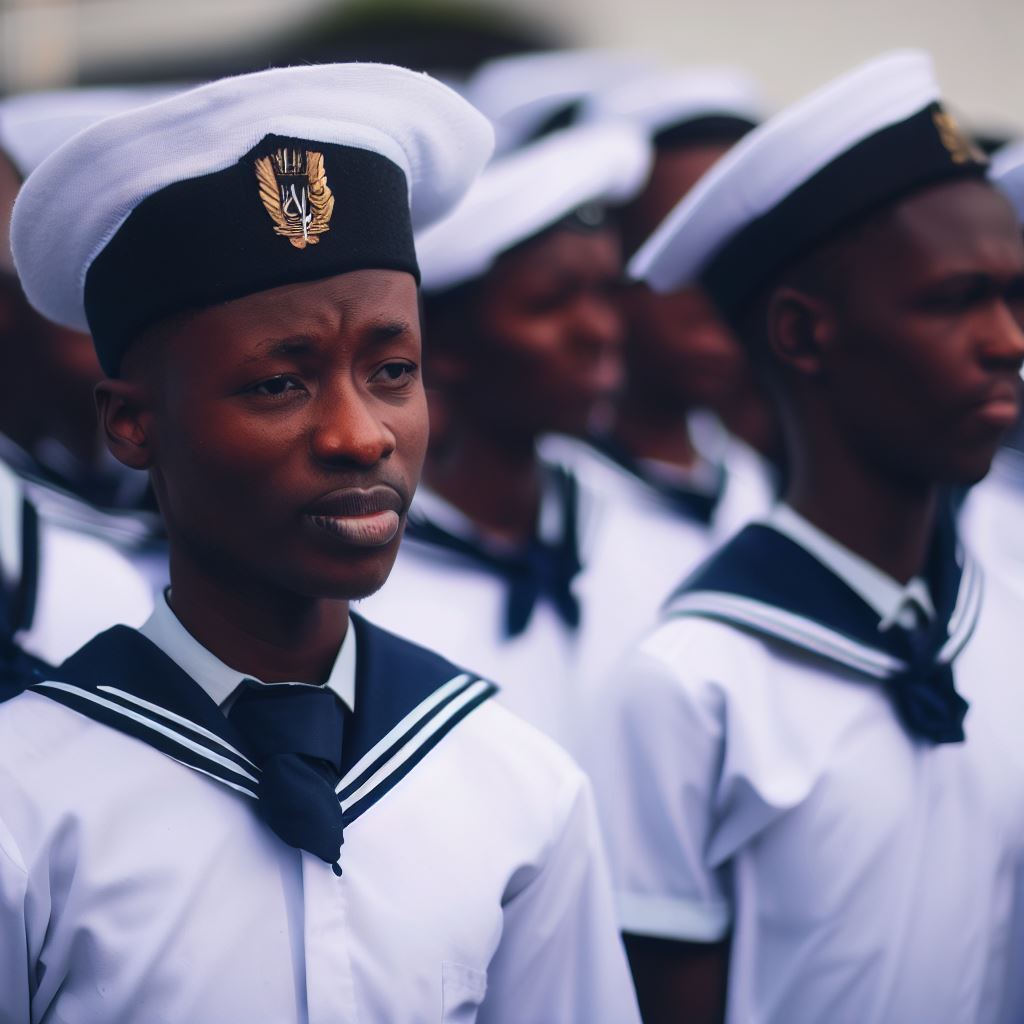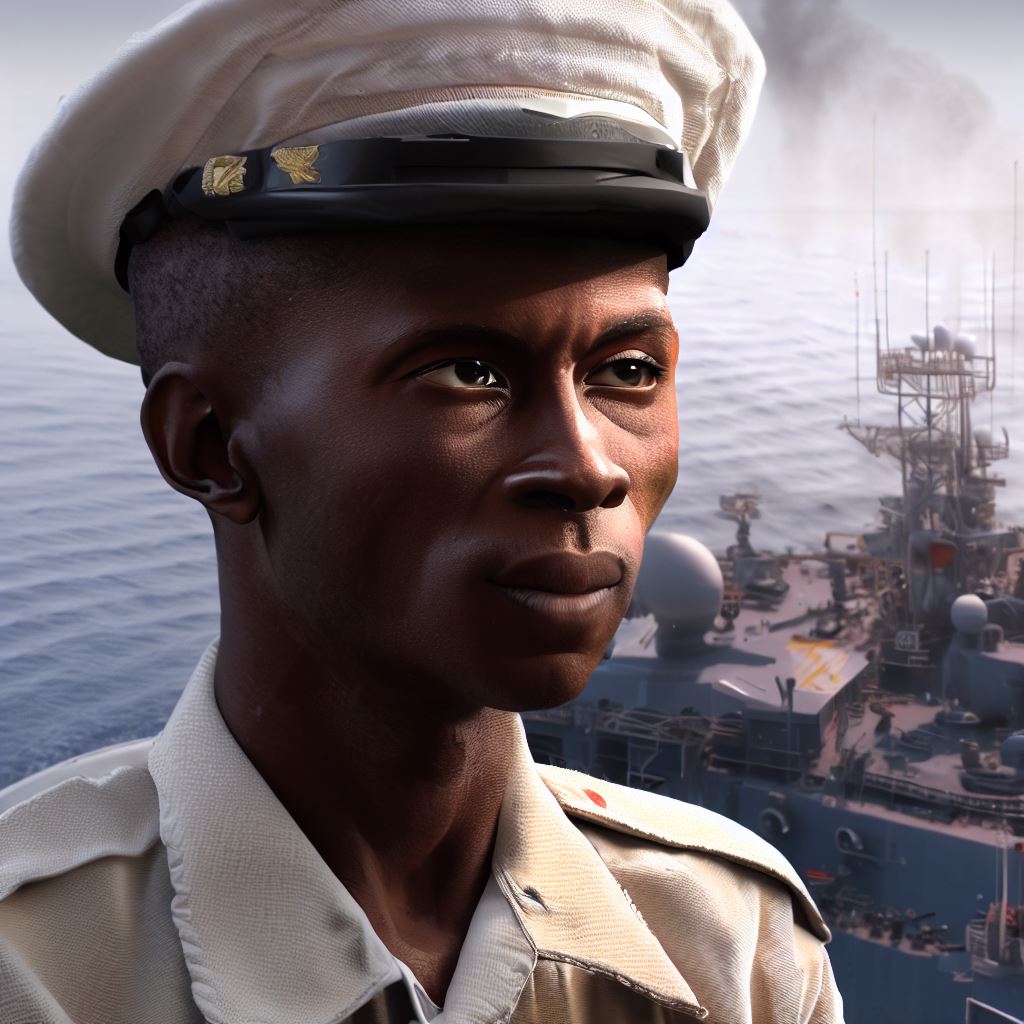Introduction and Overview
A. Nigeria’s Ports and the Role of a Marine Oiler
Nigeria’s ports are bustling hubs of trade and commerce, vital for the nation’s economy.
At the heart of these ports are marine oilers, unsung heroes who keep the maritime machinery running smoothly.
B. Purpose of the Blog Post
This blog post aims to shine a light on the often overlooked yet essential work of marine oilers in Nigeria’s ports.
Join us on a journey through their daily tasks, challenges, and the critical role they play in the maritime industry.
Get ready to explore the intriguing world of marine oilers in Nigeria’s ports.
Definition and Responsibilities of a Marine Oiler
Welcome to the next section of our blog series on Nigeria’s ports. In this section, we will explore the definition and responsibilities of a marine oiler in the context of Nigeria’s ports.
A marine oiler is an essential member of the marine industry who plays a crucial role in ensuring the smooth operation of ships and vessels in Nigeria’s ports.
They are responsible for various tasks related to the maintenance and operation of the ship’s machinery and equipment.
A. Role of a Marine Oiler in the Context of Nigeria’s Ports
In Nigeria’s ports, marine oilers play a vital role in maintaining the efficiency and reliability of maritime operations.
They work closely with the ship’s engineers and other personnel to ensure that the vessel’s machinery is properly lubricated, fueled, and maintained.
B. Primary Responsibilities and Duties of a Marine Oiler
A marine oiler’s primary responsibilities revolve around the maintenance and operation of the ship’s engines, pumps, and other mechanical equipment.
Some specific duties include:
- Performing routine maintenance tasks, such as oiling and greasing machinery parts.
- Assisting in the operation of the ship’s propulsion systems.
- Monitoring and recording machinery performance and reporting any abnormalities or malfunctions.
- Operating and maintaining auxiliary equipment, such as pumps, compressors, and generators.
- Assisting with the loading and unloading of cargo, as well as other general deck duties.
C. Necessary Qualifications and Skills for this Position
To become a marine oiler in Nigeria’s ports, certain qualifications and skills are necessary:
- Basic education and training in mechanical or marine engineering.
- Knowledge of ship systems and machinery.
- Experience in the marine industry or similar field.
- Understanding of safety procedures and regulations.
- Physical fitness and the ability to work in demanding conditions.
In addition to these qualifications, a marine oiler should possess good communication skills to effectively collaborate with other crew members and follow instructions from superiors.
They should also have a keen eye for detail to identify any potential issues or hazards that may arise during their duties.
In essence, a marine oiler plays a vital role in Nigeria’s ports by ensuring the proper functioning and maintenance of maritime vessels.
Their responsibilities include maintaining machinery, operating equipment, and assisting in cargo operations.
With the necessary qualifications and skills, a marine oiler contributes to the efficient and safe operation of ships in Nigeria’s ports.
Stay tuned for the next section in our series, where we will explore the challenges faced by marine oilers in Nigeria’s ports.
Read: Key Skills Required for Sailors and Oilers in Nigeria
The Port Environment in Nigeria
The general atmosphere in Nigeria’s ports is bustling, chaotic, and filled with activity.
The surroundings are dominated by massive cargo ships, cranes, and busy dockworkers.
The port terminals are usually crowded with trucks, containers, and people rushing to get their work done.
A. The Significance of Nigeria’s Ports
- Nigeria’s ports serve as major gateways for international trade and commerce.
- They are crucial for importing and exporting goods, facilitating economic growth and development.
- The ports handle a significant volume of cargo, including oil, minerals, agricultural products, and manufactured goods.
- Efficient port operations are vital for the country’s GDP and play a vital role in foreign exchange earnings.
B. Challenges and Unique Characteristics
- One of the biggest challenges in Nigeria’s port environment is congestion due to inadequate infrastructure and inefficiencies.
- Delays in cargo clearance and long waiting times for vessels are common issues faced by marine oilers.
- The port environment can be physically demanding, with heavy lifting, exposure to weather conditions, and noise pollution.
- Security concerns, such as piracy and theft, are also significant challenges that marine oilers need to be aware of.
Overall, the port environment in Nigeria is a dynamic and critical hub for international trade.
Despite its challenges, it plays a vital role in the country’s economy and offers employment opportunities for various professionals, including marine oilers.
Read: Nigeria’s Marine Industry: Opportunities for Sailors
Day in the Life of a Marine Oiler
A. Typical morning routine and arrival at the port
- The alarm clock buzzes at 6 am, signaling the start of another day for a marine oiler.
- After a quick shower and breakfast, the oiler grabs their safety gear and heads to the port.
- Upon arrival, they proceed to the engine room, ready to begin their day’s tasks.
B. The daily tasks and responsibilities of a marine oiler
- The marine oiler’s primary responsibility is to maintain engine room equipment, ensuring it functions optimally.
- They regularly conduct inspections to identify any potential issues or malfunctions and report them to superiors.
- Assisting with fueling operations is another crucial task, ensuring the vessel remains powered during the journey.
C. Work schedule, breaks, and potential overtime requirements
- Typically, a marine oiler works in shifts that may vary depending on the port and vessel’s requirements.
- Breaks are provided throughout the day to ensure the oiler stays refreshed and focused on their tasks.
- However, due to the nature of the job, overtime requirements might arise, especially during critical operations.
D. Potential safety considerations or precautions that a marine oiler must follow
- Safety is of utmost importance for a marine oiler, who must adhere to strict guidelines and precautions.
- Wearing appropriate safety gear, such as helmets, gloves, and safety shoes, is mandatory at all times.
- They must be well-versed in emergency protocols and firefighting techniques to mitigate potential hazards.
Being a marine oiler involves more than just routine tasks; it requires a strong dedication to maintaining and ensuring the smooth operation of a vessel’s engine room.
Despite the demanding nature of the job, the opportunity to work in a dynamic and ever-changing environment can be rewarding for those passionate about maritime operations.
However, it is crucial to emphasize that safety should always remain a top priority for both the oilers and their respective organizations.
Read: Challenges Faced by Sailors and Oilers in Nigeria Today

Interactions and Collaborations
A. Interactions between marine oilers and other crew members
- Marine oilers work closely with engineers, mechanics, and deckhands on a daily basis.
- Their interactions are essential for the smooth functioning of the port.
- They assist engineers in performing routine checks and maintenance on engines and equipment.
- Marine oilers often work alongside mechanics to troubleshoot and repair any mechanical issues that arise.
- Deckhands rely on marine oilers for assistance in handling ropes, lines, and other equipment during dockings.
B. Importance of effective communication and teamwork in the port environment
Effective communication and teamwork are key to ensuring a safe and efficient working environment.
In the fast-paced and dynamic port environment, effective collaboration and communication are imperative.
Marine oilers not only rely on the expertise of other crew members but also play a crucial role in supporting them.
When working alongside engineers, marine oilers assist in tasks such as checking oil levels, monitoring machinery, and conducting routine inspections.
Their knowledge of engine systems and equipment ensures that everything operates smoothly and efficiently.
Additionally, marine oilers work closely with mechanics to tackle any mechanical issues that may arise.
They help in troubleshooting and providing valuable input, enabling swift repairs and minimizing downtime.
During docking operations, marine oilers collaborate with deckhands to handle ropes, lines, and other equipment.
Their expertise in these tasks is crucial for the safe and efficient mooring of the vessel.
C. Collaborations or assistance that marine oilers may provide to other crew members
- Marine oilers collaborate with other crew members to ensure the proper maintenance and operation of machinery.
- Teamwork is crucial during loading and unloading operations, where coordinated efforts are required.
- Marine oilers communicate with the deck crew to ensure the safe and secure stowage of cargo.
- Their collaboration is vital in preventing accidents and maintaining the stability of the vessel.
- In emergency situations, marine oilers engage in rapid communication with other crew members.
Furthermore, marine oilers play an active role in cargo handling operations.
They work closely with the deck crew to ensure proper stowage and weight distribution of the cargo.
Clear communication and coordination between marine oilers and the deck crew are essential to maintain the stability of the ship.
In emergency situations, marine oilers serve as a vital communication link between different crew members.
They relay critical information and assist in implementing emergency response procedures.
Overall, effective collaboration, communication, and teamwork are fundamental to the operations in Nigeria’s ports.
Marine oilers interact with engineers, mechanics, and deckhands to ensure the smooth functioning of the port.
Their collaborative efforts guarantee the safe and efficient operation of machinery, cargo handling, and emergency response procedures.
Read: Working as a Marine Oiler in Nigeria: Tips and Insights
Challenges and Rewards of the Job
A. Challenges Faced by Marine Oilers in Nigeria’s Ports
Marine oilers face numerous challenges in Nigeria’s ports. They often have to endure harsh weather conditions, work with faulty machinery, and navigate through congested spaces.
- Working in adverse weather conditions, such as heavy rain and strong winds.
- Dealing with mechanical failures and breakdowns of equipment and machinery.
- Navigating through congested ports with limited maneuvering space.
- Maintaining high levels of alertness and focus during long working hours.
- Being exposed to hazardous materials and chemicals while performing maintenance tasks.
B. Physical Demands and Potential Risks
Additionally, the physically demanding nature of the job puts them at risk of injuries and accidents.
The intense physical labor, combined with long working hours, leads to exhaustion and fatigue.
- Lifting and carrying heavy loads, such as fuel drums and engine parts.
- Working in confined spaces that may have high temperatures and poor ventilation.
- Balancing on slippery surfaces and dealing with constant vibrations on the ship.
- Experiencing fatigue and physical exhaustion due to the demanding nature of the job.
- Potential risks of accidents, such as slips, trips, and falls, while working on deck.
C. Rewards and Advantages of the Job
Despite these challenges, there are several rewarding aspects to being a marine oiler. The maritime industry provides opportunities for career growth and progression.
Skilled oilers can climb the ranks and take on higher positions within the industry. Moreover, the job offers competitive salaries that attract skilled professionals.
One of the unique advantages of being a marine oiler is the ability to travel and explore different ports and countries.
This allows oilers to experience different cultures and broaden their horizons. Furthermore, working closely with fellow crew members creates a strong sense of camaraderie and teamwork.
Being a marine oiler also comes with a sense of pride and purpose. Oilers play a crucial role in global trade and commerce by ensuring that goods are transported efficiently and safely.
They contribute to the smooth functioning of the economy and the global supply chain.
In a nutshell, the life of a marine oiler in Nigeria’s ports is filled with challenges and risks.
From adverse weather conditions to physical demands, oilers need to overcome various obstacles.
However, the job also offers rewards such as career progression, competitive salaries, and the opportunity to travel and explore different parts of the world.
Despite the difficulties, marine oilers continue to play a vital role in the maritime industry.
Conclusion
This blog post explored the role of marine oilers in Nigeria’s ports and their significant contribution to the smooth operation of the maritime industry.
Marine oilers play a vital role in maintaining and operating the machinery onboard ships, ensuring the efficient and safe movement of goods in and out of the country.
Throughout the blog post, we discussed the daily tasks and responsibilities of marine oilers, which range from lubricating machinery to undertaking maintenance and repair work when necessary.
Their expertise and skills are essential in ensuring the smooth operation of ships, minimizing the risk of breakdowns or delays.
The significance of marine oilers cannot be overstated. They form an integral part of Nigeria’s ports, as their work directly impacts the efficiency and productivity of the maritime industry.
Without their diligent efforts, cargo transportation and international trade would be severely hampered.
For readers interested in pursuing a career as a marine oiler or those wanting to learn more about Nigeria’s ports, we encourage you to further explore this topic.
Understanding the unique challenges and responsibilities of marine oilers can provide valuable insights into the intricacies of the maritime industry.
It is a career path that offers stability, growth opportunities, and the chance to contribute to the thriving Nigerian economy.
Marine oilers are unsung heroes who ensure the smooth sailing of Nigeria’s ports and the maritime industry as a whole.
Their expertise and dedication keep the wheels of international trade turning, and their role should be recognized and appreciated.




